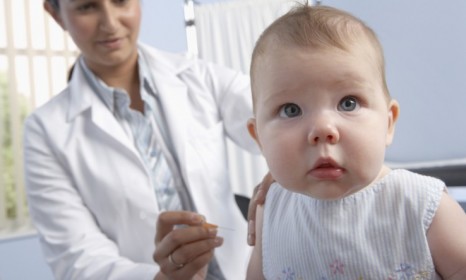Why more parents are rejecting vaccinations: 4 theories
A new study claims that 13 percent of parents don't follow the recommended vaccination schedule for their kids. What are they thinking?

A free daily email with the biggest news stories of the day – and the best features from TheWeek.com
You are now subscribed
Your newsletter sign-up was successful
More than one in 10 parents (13 percent) don't follow the recommended vaccination schedule for their children, according to a new study in the journal Pediatrics. And even among parents who do adhere to the vaccination guidelines, one in four say they're not sure it's good for their kids. These kinds of statistics are fueling worry among doctors and experts, who say that if this trend continues, the risk of preventable diseases like measles and whooping cough could increase. Why are parents increasingly skeptical of potentially life-saving needles? Here, four theories:
1. Parents still believe the autism myth
A thoroughly debunked study claiming that the measles, mumps, and rubella vaccine could cause autism has left parents with "lingering skepticism," says TIME's Alice Park. Please remember, that study has been revealed as a fraud, and the authoring physician disbarred. Nevertheless, many parents still wait until their children pass the age of 4 — autism typically takes hold before then — to vaccinate their kids. "Fears of autism have been cited as the number one concern among parents when considering vaccinations," says Jessica King at Imperfect Parent.
The Week
Escape your echo chamber. Get the facts behind the news, plus analysis from multiple perspectives.

Sign up for The Week's Free Newsletters
From our morning news briefing to a weekly Good News Newsletter, get the best of The Week delivered directly to your inbox.
From our morning news briefing to a weekly Good News Newsletter, get the best of The Week delivered directly to your inbox.
2. Parents are in denial about the risks
The new study featured in Pediatrics found that 81 percent of the parents who skipped or delayed vaccinations didn't agree with doctors that this posed a risk to their kids, says Lauren Cox at MSNBC. "That's wrong," says Dr. Paul Offit, the chief of Infectious Diseases at the Children's Hospital of Philadelphia. "Those decisions are being made not only on false beliefs on vaccine safety, but also false beliefs on contagious disease and transmission."
3. Parents aren't familiar with these diseases
Dr. William Schaffner, who chairs the department of preventive medicine at Vanderbilt University, tells CNN that the "main problem" is that parents don't know much about the diseases their children are being inoculated against. This is unsurprising: Parents hear less about these conditions because vaccines have largely eradicated them. But don't be fooled: These diseases "can spring back if enough of the population goes unvaccinated." For instance, the U.S. saw 198 confirmed cases of measles this year, the highest since 1996. In most of the cases, the patients were unvaccinated.
A free daily email with the biggest news stories of the day – and the best features from TheWeek.com
4. Parents think they're smarter than doctors
"The days when people obeyed doctors' orders without question are over," says Barbara Loe Fisher, co-founder and president of the National Vaccine Information Center. That's largely a reflection of "the higher education level of young parents," who have greater access to health care information that ever before, and know that "vaccines are like prescription drugs, and carry risks that can be greater for some children than others because, biologically, children are not all the same." To convince such parents, doctors are going to have to work a little harder at "a relationship that involves shared decision-making."
Sources: Imperfect Parent, TIME, MSNBC, CNN, U.S. News
-
 At least 8 dead in California’s deadliest avalanche
At least 8 dead in California’s deadliest avalancheSpeed Read The avalanche near Lake Tahoe was the deadliest in modern California history and the worst in the US since 1981
-
 Political cartoons for February 19
Political cartoons for February 19Cartoons Thursday’s political cartoons include a suspicious package, a piece of the cake, and more
-
 The Gallivant: style and charm steps from Camber Sands
The Gallivant: style and charm steps from Camber SandsThe Week Recommends Nestled behind the dunes, this luxury hotel is a great place to hunker down and get cosy